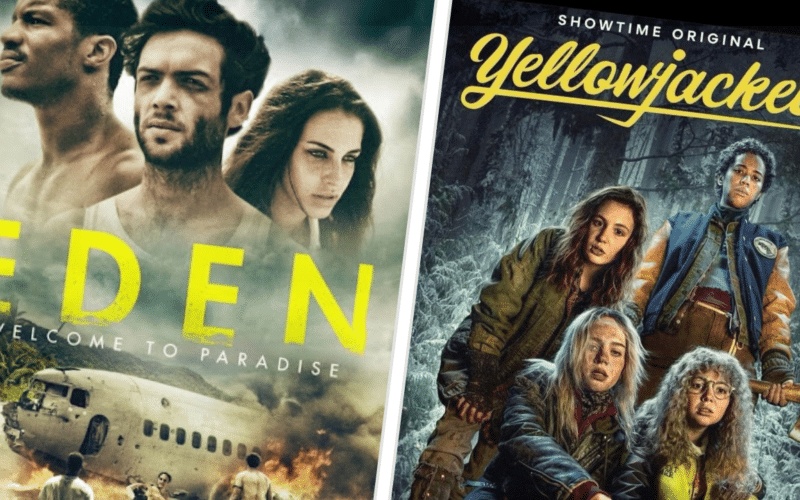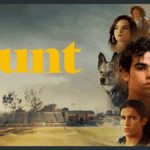A recycled plot device sparks a copyright infringement lawsuit against Showtime’s Yellowjackets, but this case is destined for a crash landing in court.
The creators of Showtime’s Yellowjackets have been stung with a new copyright lawsuit filed by the producers of the 2015 survival film Eden, a little-seen and eminently forgettable retread of Lord of the Flies centered on a men’s soccer team stranded on a deserted island after a plane crash. If that sounds familiar, it should. In 1972, a Uruguayan rugby team famously endured a harrowing ordeal in the Andes after their plane crashed. The survivors were forced to resort to cannibalism, a true story later immortalized in Alive. Combine that real-life tragedy with elements from Lost, Survivor, and countless other survival staples, and you have Eden—a movie so uninspired that its 24% Rotten Tomatoes score feels generous.
Making a lousy film with a recycled plot is bad enough. But filing a lawsuit claiming that your recycled plot is original—and accusing someone else of ripping you off—that’s truly next level.
The complaint (read here), filed by the producer of Eden against Showtime and the creators of Yellowjackets, alleges that the hit series copies Eden’s supposedly “original” elements, but the plaintiff’s copyright claims are about as flimsy as the plot they’re trying to protect.
Both works center on a soccer team whose plane crashes, stranding them in a desolate location where they’re forced to grapple with the harsh environment, dwindling resources, and the slow collapse of social order. In Eden, the protagonists are a men’s soccer team returning to the U.S. from a World Cup match in Brazil when their plane crashes on a Malaysian island. (Apparently no one involved in creating this thing bothered to consult a map.) In Yellowjackets, it’s a high school girls’ soccer team stuck in the Canadian wilderness on the way to a national championship.
The plaintiff claims both works explore similar core themes, including survival, “the importance of teamwork and cooperation,” the emergence of a “cult mentality,” “identity and self-discovery,” and the “fragility of civilization.” Each story allegedly delves into how extreme circumstances force the characters to adapt, wrestle with ethical dilemmas, and confront the darker sides of human nature. Both settings are described as remote and desolate, far removed from civilization, and the complaint claims that characters in both works grapple with escalating tensions and traumatic events such as murder, cannibalism, and psychological deterioration.
The lawsuit doesn’t stop there. It highlights numerous—decidedly generic—plot parallels, claiming that both works follow a similar trajectory: a plane crash, an initial effort to survive, the breakdown of unity as factions emerge, moral decay in the face of desperation, and ultimately, rescue by an outside force. As the characters struggle to endure, “tensions rise, alliances form, dark secrets emerge, and moral boundaries are pushed to their limits—blurring the line between good and evil.” (And yet somehow, amid all the carnage of Eden, the castaways manage to find time to play soccer and have sex with the daughters of the coach who died in the crash.)

At this point, we might as well be talking about Robinson Crusoe, The Donner Party, Lost, Lord of the Flies, or even Gilligan’s Island. It doesn’t matter. Survival struggles, factionalism, and descents into chaos are absolute staples of the genre—not original concepts that any one creator can claim as their own. Once you have a plane crash, you’re inevitably going to get infighting, resource scarcity, and moral decay. There’s even a fancy French term for this: scènes à faire—situations or incidents that naturally flow from a particular premise. You can’t claim ownership over this kind of trope in a survival story any more than you can copyright love triangles in a romance movie.
Making a lousy film with a recycled plot is bad enough. But filing a lawsuit claiming that your recycled plot is original—and accusing someone else of ripping you off—that’s truly next level.
That’s why the plaintiff’s claims are likely to meet the same fate as the lawsuit against Adam McKay and Netflix, who were accused of ripping off a self-published novel to make the film Don’t Look Up. That case was dismissed last week (read order here) after the court found that the plaintiff was attempting to assert ownership over generic and unprotectable ideas. The alleged plot similarities flowed from the unprotectable premise of an impending comet strike on Earth: “discovery of the comet and reactions from the public and various government actors, including impulsive behavior, apathy, and fear, are all ‘situations and incidents which flow naturally’ from the basic premise of each work.”
The court in the Don’t Look Up case also rejected as unprotected the claimed “common themes including science as a political issue, apathy, and mob mentalities with ‘greed’ as the ‘immediate reaction.’” The decision reinforces that broad themes and predictable scenarios can’t form the basis of a copyright claim.

The most absurd part of the Eden/Yellowjackets lawsuit isn’t its shaky legal foundation—it’s the notion that Eden is a groundbreaking work being ripped off by Yellowjackets. In reality, Yellowjackets is a far more original work, employing a dual-timeline narrative that juxtaposes the characters’ past traumas with their present lives and introduces supernatural and psychological horror elements. Its focus on the long-term psychological impact and the mystery surrounding their ordeal elevate it beyond Eden’s straightforward survival plot. Meanwhile, Eden is, at best, a by-the-numbers survival drama with a story that feels like it was assembled in a cliché factory.
The bottom line is that Eden owes more to its predecessors than Yellowjackets owes to Eden. This mess of a lawsuit needs to be voted off the island, forthwith.
Of course, please feel free to go ahead and tell me that I’m the one who deserves to be kicked off the island. Use the comments below or @copyrightlately on social media.
View Fullscreen






4 comments
But other than that, how did you like the Eden film.?!?!
118 minutes of my life i’ll never get back…
The idea that the show would damage Eden when there are 36,484,859 Collider articles saying things like “14 films you need to watch if you loved Yellowjackets” is wild.
They have a bigger issue when not even Collider recognises the similarities between the two 🤣
That could go in a copyright treatise/hornbook/casebook of examples of scenes a faire. My word.